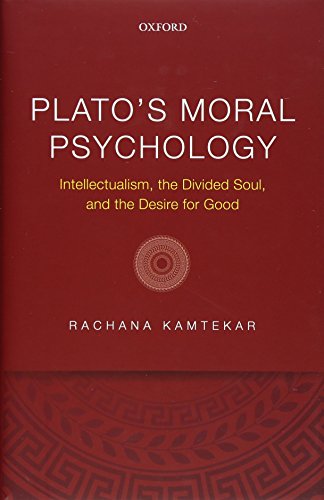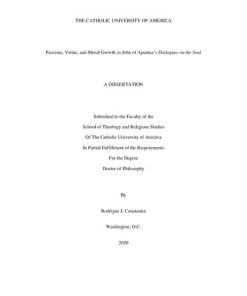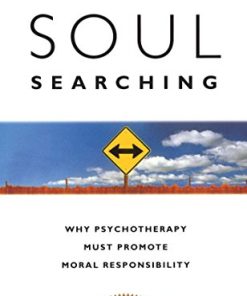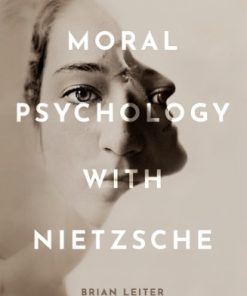(Ebook PDF) Platos Moral Psychology Intellectualism the Divided Soul and the Desire for Good 1st edition by Rachana Kamtekar 0192519387 9780192519382 full chapters
$50.00 Original price was: $50.00.$25.00Current price is: $25.00.
Plato’s Moral Psychology: Intellectualism, the Divided Soul, and the Desire for Good 1st edition by Rachana Kamtekar 0192519387 9780192519382 – Ebook PDF Instant Download/DeliveryISBN:
Full dowload Platos Moral Psychology: Intellectualism, the Divided Soul, and the Desire for Good 1st edition after payment.

Product details:
ISBN-10 : 0192519387
ISBN-13 :9780192519382
Author: Rachana Kamtekar
Plato’s Moral Psychology is concerned with Plato’s account of the soul and its impact on our living well or badly, virtuously or viciously. The core of Plato’s moral psychology is his account of human motivation, and Rachana Kamtekar argues that throughout the dialogues Plato maintains that human beings have a natural desire for our own good, and that actions and conditions contrary to this desire are involuntary (from which follows the ‘Socratic paradox’ that wrongdoing is involuntary). Our natural desire for our own good may be manifested in different ways: by our pursuit of what we calculate is best, but also by our pursuit of pleasant or fine things – pursuits which Plato assigns to distinct parts of the soul. Kamtekar develops a very different interpretation of Plato’s moral psychology from the mainstream interpretation, according to which Plato first proposes that human beings only do what we believe to be the best of the things we can do (‘Socratic intellectualism’) and then in the middle dialogues rejects this in favour of the view that the soul is divided into parts with some good-dependent and some good-independent motivations (‘the divided soul’).
Platos Moral Psychology: Intellectualism, the Divided Soul, and the Desire for Good 1st Table of contents:
1: Doctrine and Dialectic in Plato´s Dialogues
1.1 Introduction
1.2 The Relationship between Republic I and II-X
1.3 Thrasymachus´ Long Shadow: Justice, Law, and the Happiness of the Whole City
1.4 Conclusion
Notes
2: Psychology for Sophists
2.1 Introduction
2.2 The Introduction of Psychological Eudaemonism in the Protagoras
2.2.1 Stage II: Refutation of the Many (353c4-356a5)
2.2.1.1 The strength account of the refutationof the many
2.2.2 Stage III: Protreptic (356b1-357e8)
2.2.3 Stage IV: Explanation (358a5-360d9)
2.2.3.1 Implications of psychological eudaemonism´s hypothetical status in the protagoras
2.3 A Comparison of Explanations on the Force and Appearance Models
Notes
3: Why is Wrongdoing Unwilling?
3.1 Introduction
3.2 Why Psychological Eudaemonism Is Not the Basis for `No One Does Wrong Willingly´
3.3 Who Believes `No One Does Wrong Willingly´?
3.3.1 Unwillingness in Excusing Arguments: Compulsion
3.3.2 Unwillingness in Immoralist Arguments: Contrariety to Nature
3.3.3 Ignorance in Tragedy and the Law
3.4 Instrumental Desires and the Unwillingness of Wrongdoing
3.4.1 Attribution and Deattribution of Psychological Attitudes
3.4.2 Appetitive Desires
3.4.3 Hippias Minor on How It Could Be the Good Person Who Does Wrong Willingly
3.5 The Unwillingness of Badness from the Republic to the Laws
Notes
4: The Divided Soul
4.1 Introduction
4.2 Soul-Division in Republic IV and X
4.3 Characterizing Soul-Parts as Good-Directed: Agent-Likeness and Personification
4.3.1 Personification
4.4 Teleological Explanation and the Divided Soul
Notes
5: Why is the Divided Soul Tripartite?
5.1 Introduction
5.2 The Spirited Part of the Soul in the Republic
5.3 The Spirited Part of the Soul in the Timaeus
5.4 The Spirited Part of the Soul in the Phaedrus
Notes
6: Psychological Eudaemonism and Explanation
6.1 Introduction
6.2 Republic X on Seeing Things from the Agent´s Point of View
6.3 Explanation by Intelligence in the Phaedo
6.3.1 Explanation by Forms and Characters
6.4 Psychological and Teleological Explanations
People also search for Platos Moral Psychology: Intellectualism, the Divided Soul, and the Desire for Good 1st:
plato’s moral philosophy
plato’s morality
plato’s moral theory
plato morals
plato’s moral psychology
You may also like…
Politics & Philosophy - Ancient & Medieval Philosophy
Politics & Philosophy - General & Miscellaneous Philosophy
Religion & Spirituality - Religious Studies
Politics & Philosophy - Social Sciences
Politics & Philosophy - General & Miscellaneous Philosophy
The Political Soul : Plato on Thumos, Spirited Motivation, and the City
Politics & Philosophy - Anthropology
Politics & Philosophy - Anthropology











